McGill sports' golden era
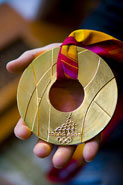
It isn't always easy being a McGill athlete. After all, at a school that produces Nobel Prize winners, prime ministers, astronauts and Supreme Court justices, there just isn't a lot of spotlight to go around. But that doesn't lessen the accomplishments of our Redmen and Martlet teams. Since January alone, the university's athletes have enjoyed unsurpassed success, excelling on the provincial, national and international stages. Be it on the slopes, in the pool or at the rink, there always seems to be a McGillian bowing their head to accept another medal.
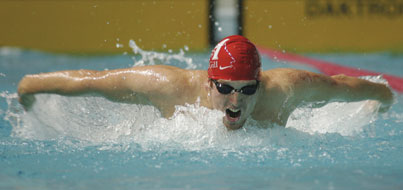
François Castonguay
Andrew Dobrowolskyj
A case in point. This past weekend, McGill's François Castonguay (U2 Physics) (above) won a pair of silver medals at the Canadian Interuniversity Sports (CIS) national championships - despite sitting out most of the fall season with a shoulder injury. At precisely the same time, Genevieve Jenkins (U4 English and History) was winning three golds and a silver at the Quebec university women's track and field championships, en route to leading the Martlets to the overall title.
In many ways, Jenkins typifies McGill athletes - a champion in her sport who also excels in the classroom. In 2005, she was named an Academic All-Canadian for maintaining an average of 80 percent or more while competing in a varsity sport. Since the inception of the All-Canadian awards in 1990, 1,257 McGill athletes have been so honoured - more than any other Canadian university.
What is most refreshing about Jenkins is that despite her many individual achievements she says her favorite race is the relay - the only team event in track and field. "I love this team," she says. "Every season that I do well, I owe to my teammates."
As you'll see in the following stories, Jenkins' attitude is the norm rather than the exception among McGill's student-athletes.
Squaring off with J.P. Darche
Snap decision changes med student's life
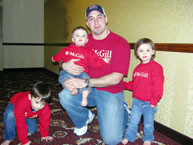
J.P. Darche and his three well-clad children, Justin (right), Catherine (left) and Zachary (in arms), play in the Seahawks' hotel hallway just days before the big game.
Lucie Darche
J.P. Darche earns his living getting wailed upon by snarling behemoths who can tip the scales at 350 pounds. Although it sounds like a nightmare to most, Darche claims he's "living the dream." That's because the native of Saint Laurent, once an all-star middle linebacker for the Redmen, is in his sixth year as the long snapper for the NFL's Seattle Seahawks. On February 5, he made history by becoming the first McGill grad to partake in the football's ultimate game; the Super Bowl. And although his Seahawks lost to the Pittsburgh Steelers, Darche has stood at the base of football's Everest.
Unless you follow football, chances are you've never heard of a long snapper. Simply put, he's the guy in the middle of the line who bends over and throws the ball between his legs to the kicker during punts or to the holder on field goals. Once the ball is successfully delivered, he must try to stem the avalanche of monstrous men looking to crash through the line and wreak havoc with the kicker. Darche, who at 245 pounds is considered "small" for his position, has absorbed more than his share of malice.
Before questioning Darche's intelligence, remember that he was a five-time Academic All-Canadian while anchoring the Redmen defense during the 1990s. Earning a BSc with a GPA of 3.61, he entered medical school with the intention of becoming an orthopedic surgeon.
But a funny thing happened on the way to the operating forum. Two years into med school, he took a sabbatical from his studies to pursue his dream of playing pro football.
In 2000, after a brief stint with the Toronto Argonauts of the CFL, Darche was invited by the Seahawks to try out as their long snapper. To his amazement, he was offered a contract after a 30-minute workout.
Darche's intelligence has been put to good use on the gridiron. He knows that successful long snappers have to get the ball to the punter in .8 seconds or less. A tireless worker, Darche averages .75 seconds. To make the punter's task easier, the ball should also arrive slightly off centre over his kicking leg. This attention to detail can mean the difference between a successful kick or one that is blocked. Whole seasons have been ruined by one botched snap. "The only time we get attention is when we mess up," Darche says. "It's better to go unnoticed."
But his cloak of invisibility was shredded in the week leading up to the Super Bowl. Used to sitting in the wings while the Seahawks' superstars field endless questions about the minutiae of their lives, Darche ound himself with a dozen cameras and mikes in his face. "I guess being French Canadian and a med student made me a novelty act."
Even over the phone, Darche can't hide his kid-in-a-candy-store enthusiasm. "I know how fortunate I am, I don't take it for granted. This is not the real world - being paid really well to play a game I love."
Darche is also a realist. "I won't have a 15-year career because I want to make sure I get back to med school before I'm too old," he laughs. "But I'd be crazy not to take this chance while I have it." Spoken like a man with one more mountain left to climb.
Hockey nights at McConnell
Pucksters barrel into playoffs
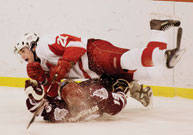
McGill's Sam Bloom lowers the boom on Billy Triantafilos of the Ottawa Gee-Gees during Game Three of the OUA East semifinals at McConnell Arena on February 26. The Redmen won the game 3-1 to move on to the conference finals.
Andrew Dobrowolskyj
Redmen: Bringing joy back to hockey Mudville
It's March and Montreal hockey fans are suffering a bad case of the blues. The Canadian men's Olympic flame-out still burns, the Montreal Canadiens are wallowing in mediocrity yet again and José Theodore's life is looking more surreal than Salvador Dali's melting clocks. Thank heaven for the McGill Redmen.
This year, the Redmen soared to the number-one ranking in the country while finishing the season with a conference-best record of 20 wins, 1 loss and 3 ties. The squad followed this up with a rousing come-from-behind win en route to bouncing the Ottawa Gee Gees from the first round of the play-offs Sunday, February 26.
Coach Martin Raymond credits the team's success to strong recruiting, good goaltending and commitment among his players. The Redmen have also been buoyed by a surge in fan support that has caused attendance to swell at McConnell Arena.
"We notice it and appreciate it," said Raymond. "It's very exciting for our players to play in front of these sort of crowds, it's good for recruiting and very pleasing for me, having been with the hockey team since 1987."
The team's stand-out season comes during the 129th year of hockey at McGill, the place that founded the first organized hockey club in the world. Their inaugural game was played on January 31, 1877, according to an article from that year published in the McGill University Gazette.
Though proud of its history, the team is entirely focused on the present. On March 1, the Redmen began a best-of-three Eastern Conference finals series with a 4-3 victory over the Patriotes, their arch-rivals from the Université du Québec à Trois-Rivières. A busload of McGill fans will be on hand at UQTR for the second game of the series, to be played on Friday, March 3 (the third game, if necessary, will be played back at McConnell on March 5). Should the Redmen prevail, they will head off to the CIS national championships taking place in Edmonton at the end of the month.
Follow the Redmen's sweet season at: www.athletics.mcgill.ca
Martlets: Heart, soul and plenty of talent
Vince Lombardi once spoke of something he called "heart power," saying that once an athlete has it, "nothing will stop [her], short of success." Looking at the McGill Martlets Hockey Team, it is clear that heart power can take a team far. "In terms of team chemistry," says Head Coach Peter Smith, "it's the best team I've ever had." Held together by tight bonds of friendship, trust and passion for the game, the Martlets finished first in the QSSF by seven points. On Tuesday the team beat Ottawa in Game 1 of the best-of-three conference championship series.
What powers their success is nothing more than the human qualities of leadership, empathy and inclusiveness. Of course they also have talent, which took them undefeated to early December. Then, according to left winger Valerie Paquette, "We kind of sat on our talent. But we quickly realized that lying purely on our talent was not going to help us." The team's cohesion gave then the ability to learn from their mistakes as a whole in order to constantly improve every aspect of their game.
Coach Smith believes that the kind of leadership that promotes inclusiveness has been essential to the team's chemistry. "A real leader makes time for everyone on the team," he says. "It's easy to encourage someone you're close to, but it's more difficult to spend time with and encourage someone you're not close to." According to Smith, it has been not only the senior players, but all the players who have demonstrated the ability to empathize with and encourage even those team members whom they did not know as well.
And from this base, the team was able to move out of its comfort zone. Players began making sacrifices both on and off the ice, knowing that their team would come through for them. As goaltender Catherine Herron says, "They always had my back, so I had their back in return." The heart of the Martlets' power is not the coach or the team leaders, the goalies or the leading scorers alone, but teamwork.
From the fringe
While we hear an awful lot about McGill's varsity sports, there are many teams that operate under the radar. Some of these teams receive no funding from the university and, as a result, must pay for their own equipment, coaching and practice time. Make no mistake, despite the lack of both financial support and recognition, these athletes train and compete with just as much intensity as their more fortunate peers.
Synchro swimmers rule the pool
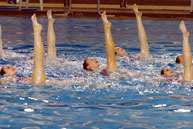
The Martlet synchro team make it look easy at a meet at U of T on January 21. The McGill A squad took the gold in the Team Routine.
Ten ornamental swimmers slide into the water, faces painted with makeup and hair tightly gel-bound. Their bathing suits glimmer as music suddenly fills the room. The athletes move in perfect harmony in a captivating water-dance of upside-down splits, pirouettes and lifts (all the while treading water). But don't let the sequins and nose plugs throw you - the McGill Martlets synchronized swimming team takes no prisoners.
Despite the lack of funding from the university, the team has won the Gerry Dubrule trophy for best overall team at the Canadian University Synchronized Swimming League championships for three out of four years. Their most recent title came on February 5, in St. Catharines, Ontario.
This is a sport that demands the grace of a ballerina, the strength of a weightlifter and the flexibility of a gymnast. "Like dance figure skating, synchronized swimming is very difficult, but the purpose is to make everything look easy," says Ami Feige, who began synchronized swimming at age six. "The body does not naturally do these things." The 22-year-old physiology major has been part of the squad ever since she began her university studies three years ago. This season, she's also serving as team president and head coach of the 25-member group.
As if being coach, administrator and athlete weren't enough, Feige has been landing herself on the Principal's Student Honour Roll for the past three years - which requires athletes to maintain a GPA of at least 3.5 while participating in their sport.
The Martlets come by their success the oldfashioned way - they earn it. On top of having to raise their own funds and fight for pool time, the squad practices together two to three times per week, for two to three hours a shot. "It takes a lot of patience, perseverance and time to get good at [synchronized swimming]," laughs Feige. "I tried it sixteen years ago and never really stopped."
Figure skaters make impressive leap

McGill's Samuel Bail has won two stages and one time trial of the grueling Tour of Africa bike race. The 11,900-kilometre continent-long, 10-country competition is divided into 100 stages and billed as the world's longest bike race.
On February 25, McGill's figure skating team finished a remarkable journey. Seventh at the Ontario University Athletics (OUA) championships last season, the squad took second place out of 10 teams this year, edged out by Queen's by a mere five points.
As members of a club team the figure skaters pay for ice time out of their own pockets. Because they compete in the OUA, they have no competitions at home. Instead, they rent a van and drive themselves to Kingston, Toronto and beyond. Imagine trying to nail a double toe loop after driving for eight hours.
The team is also responsible for its own recruiting and fundraising. They are currently prepping for their annual year-end show on March 24 at McConnell Arena. To top it all off, most of the 17-member team, are studying full-time in such demanding disciplines as science, law and medicine.
For Katherine McCall, the love of skating far outweighs any obstacles the team faces. "We put so much into skating that every success the team has is that much more enjoyable." The 19-year-old chemical engineering student from Palos Verde, California, knows all about success, having won two individual gold medals and a silver in the pairs at the OUA finals.
McCall's schedule, like those of her teammates, seems almost monastic in its dedication. Getting up at 5:30 a.m., she's on the ice from 6:30 to 8:00. Then it's off to class, back on the ice if its free, lab time, homework in the library and some dry land training in the afternoon. In the evening she often practices with a TMR figure skating club before bedding down at 9:30.
When asked about her social life or lack thereof, McCall laughs. "Most of us are in such demanding programs that we don't party too much. What we like most is hanging out together." In this case it seems that familiarity breeds excellence.
Group of eight at the Games

Andrew Dobrowolskyj
McGill was well represented at the recent Turin Olympics. Jennifer Heil's gold medal was matched by Kim St-Pierre's (BEd '05, pictured at left in her days as a Martlet), goalie for the Canadian women's hockey team. Martlets' hockey coach Peter Smith served as an assistant coach for the team. Management student Laura Ruhnke played for the Swiss women's hockey team.
Tyson Heung (Bed '05) competed in speed skating for Germany. On the administration side, Derek Covington (BA '92) went as a Canadian Olympic Committee member; Howard Stupp (BEng '78, BCL '83, LLB '83) went as a member of the International Olympic Committee; and Chancellor Richard Pound served as the Chairman of the World Anti-Doping Agency.

